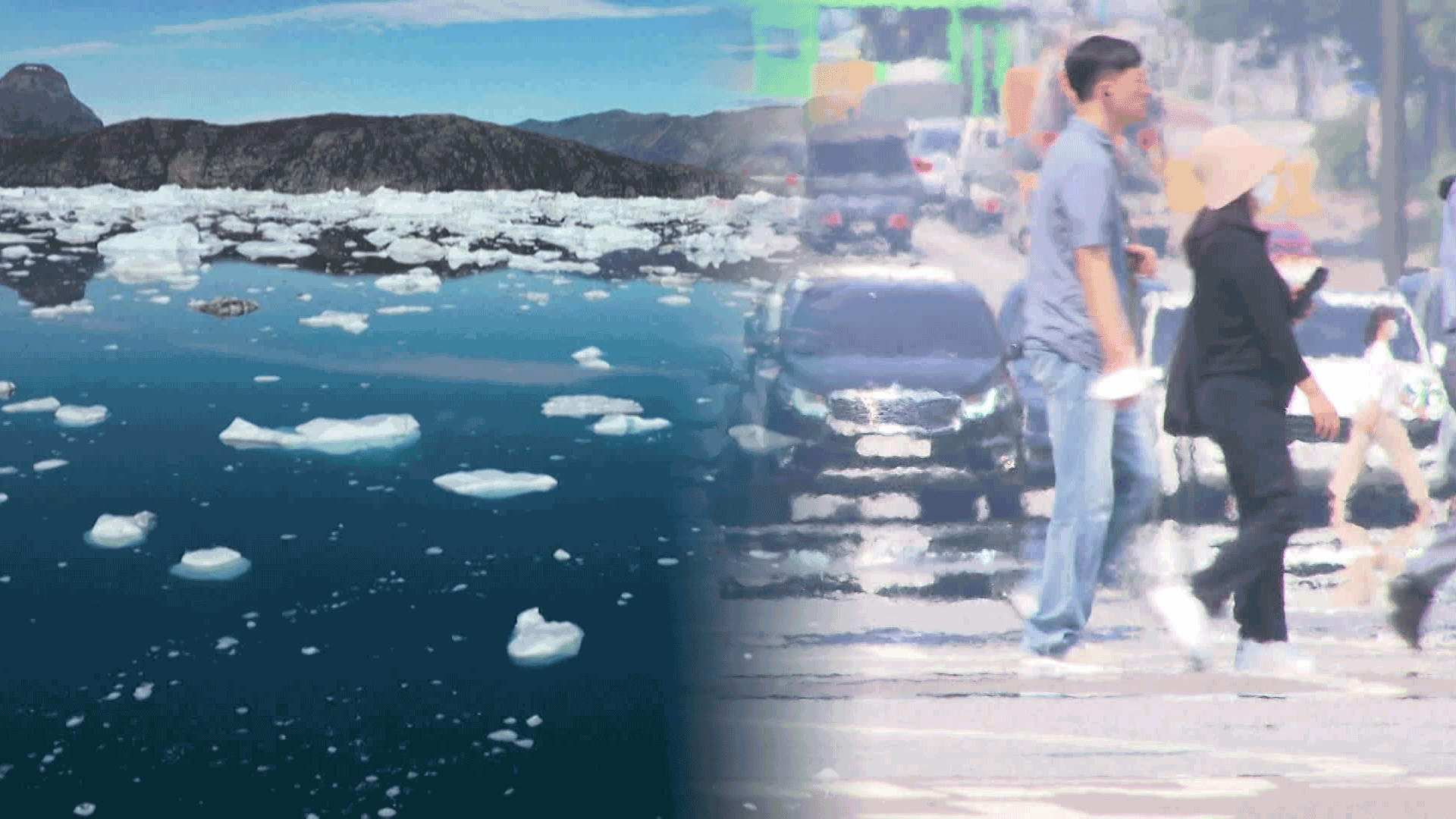[Anchor]
Arctic sea ice and its melting extent have hit record lows since satellite observations began, starting from last winter.
As a result, experts warn that the chances of heatwaves and torrential rains hitting South Korea this summer have increased.
Shin Bang-sil, a meteorology specialist, reports.
[Report]
Researchers are using satellites to monitor the extent of Arctic sea ice in real time.
Arctic sea ice typically melts between April and September and expands again during the winter.
However, an unusual pattern has emerged since last winter.
[Park Jeong-won/Head Researcher, Korea Polar Research Institute: "Records from last November to this March show that the (Arctic sea ice extent) has consistently remained below the average level, and this year will go down in history as the lowest recorded by satellite observations."]
The reason the reduction of sea ice in the far Arctic is significant is that it affects the weather in our country this summer.
The reduced ice allows the ocean to absorb more heat than usual.
As warm air rises over the heated ocean, it disrupts the atmospheric circulation in the Arctic.
This influence causes the jet stream over East Asia to fluctuate north and south, increasing the variability of summer temperatures in our country.
[Ye Sang-wook/Professor, Department of Marine Science & Convergence Engineering, Hanyang University: "Given the recent trends, the variability of temperatures is quite large, so the frequency of short heatwaves and extreme heat events is likely to increase."]
If the cold, dry air from the Arctic frequently pushes down, it can collide with the hot, humid air from the south, increasing the possibility of sudden heavy rains.
Following last summer's worst heatwave, there is a high likelihood of extreme weather this summer as well, so preparations should be expedited.
This is KBS News, Shin Bang-sil.
Arctic sea ice and its melting extent have hit record lows since satellite observations began, starting from last winter.
As a result, experts warn that the chances of heatwaves and torrential rains hitting South Korea this summer have increased.
Shin Bang-sil, a meteorology specialist, reports.
[Report]
Researchers are using satellites to monitor the extent of Arctic sea ice in real time.
Arctic sea ice typically melts between April and September and expands again during the winter.
However, an unusual pattern has emerged since last winter.
[Park Jeong-won/Head Researcher, Korea Polar Research Institute: "Records from last November to this March show that the (Arctic sea ice extent) has consistently remained below the average level, and this year will go down in history as the lowest recorded by satellite observations."]
The reason the reduction of sea ice in the far Arctic is significant is that it affects the weather in our country this summer.
The reduced ice allows the ocean to absorb more heat than usual.
As warm air rises over the heated ocean, it disrupts the atmospheric circulation in the Arctic.
This influence causes the jet stream over East Asia to fluctuate north and south, increasing the variability of summer temperatures in our country.
[Ye Sang-wook/Professor, Department of Marine Science & Convergence Engineering, Hanyang University: "Given the recent trends, the variability of temperatures is quite large, so the frequency of short heatwaves and extreme heat events is likely to increase."]
If the cold, dry air from the Arctic frequently pushes down, it can collide with the hot, humid air from the south, increasing the possibility of sudden heavy rains.
Following last summer's worst heatwave, there is a high likelihood of extreme weather this summer as well, so preparations should be expedited.
This is KBS News, Shin Bang-sil.
■ 제보하기
▷ 카카오톡 : 'KBS제보' 검색, 채널 추가
▷ 전화 : 02-781-1234, 4444
▷ 이메일 : kbs1234@kbs.co.kr
▷ 유튜브, 네이버, 카카오에서도 KBS뉴스를 구독해주세요!
- Record Arctic melt risk
-
- 입력 2025-05-06 23:42:21

[Anchor]
Arctic sea ice and its melting extent have hit record lows since satellite observations began, starting from last winter.
As a result, experts warn that the chances of heatwaves and torrential rains hitting South Korea this summer have increased.
Shin Bang-sil, a meteorology specialist, reports.
[Report]
Researchers are using satellites to monitor the extent of Arctic sea ice in real time.
Arctic sea ice typically melts between April and September and expands again during the winter.
However, an unusual pattern has emerged since last winter.
[Park Jeong-won/Head Researcher, Korea Polar Research Institute: "Records from last November to this March show that the (Arctic sea ice extent) has consistently remained below the average level, and this year will go down in history as the lowest recorded by satellite observations."]
The reason the reduction of sea ice in the far Arctic is significant is that it affects the weather in our country this summer.
The reduced ice allows the ocean to absorb more heat than usual.
As warm air rises over the heated ocean, it disrupts the atmospheric circulation in the Arctic.
This influence causes the jet stream over East Asia to fluctuate north and south, increasing the variability of summer temperatures in our country.
[Ye Sang-wook/Professor, Department of Marine Science & Convergence Engineering, Hanyang University: "Given the recent trends, the variability of temperatures is quite large, so the frequency of short heatwaves and extreme heat events is likely to increase."]
If the cold, dry air from the Arctic frequently pushes down, it can collide with the hot, humid air from the south, increasing the possibility of sudden heavy rains.
Following last summer's worst heatwave, there is a high likelihood of extreme weather this summer as well, so preparations should be expedited.
This is KBS News, Shin Bang-sil.
Arctic sea ice and its melting extent have hit record lows since satellite observations began, starting from last winter.
As a result, experts warn that the chances of heatwaves and torrential rains hitting South Korea this summer have increased.
Shin Bang-sil, a meteorology specialist, reports.
[Report]
Researchers are using satellites to monitor the extent of Arctic sea ice in real time.
Arctic sea ice typically melts between April and September and expands again during the winter.
However, an unusual pattern has emerged since last winter.
[Park Jeong-won/Head Researcher, Korea Polar Research Institute: "Records from last November to this March show that the (Arctic sea ice extent) has consistently remained below the average level, and this year will go down in history as the lowest recorded by satellite observations."]
The reason the reduction of sea ice in the far Arctic is significant is that it affects the weather in our country this summer.
The reduced ice allows the ocean to absorb more heat than usual.
As warm air rises over the heated ocean, it disrupts the atmospheric circulation in the Arctic.
This influence causes the jet stream over East Asia to fluctuate north and south, increasing the variability of summer temperatures in our country.
[Ye Sang-wook/Professor, Department of Marine Science & Convergence Engineering, Hanyang University: "Given the recent trends, the variability of temperatures is quite large, so the frequency of short heatwaves and extreme heat events is likely to increase."]
If the cold, dry air from the Arctic frequently pushes down, it can collide with the hot, humid air from the south, increasing the possibility of sudden heavy rains.
Following last summer's worst heatwave, there is a high likelihood of extreme weather this summer as well, so preparations should be expedited.
This is KBS News, Shin Bang-sil.
-
-

신방실 기자 weezer@kbs.co.kr
신방실 기자의 기사 모음
-
이 기사가 좋으셨다면
-
좋아요
0
-
응원해요
0
-
후속 원해요
0















이 기사에 대한 의견을 남겨주세요.